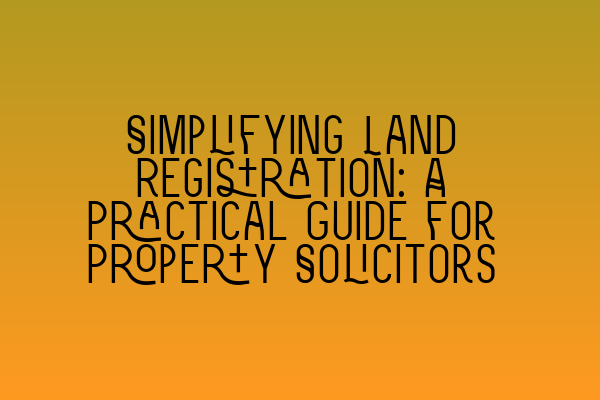Simplifying Land Registration: A Practical Guide for Property Solicitors
Land registration is a fundamental aspect of property law that property solicitors deal with on a regular basis. It involves the registration of legal interests in land with the Land Registry, ensuring transparency and security in property ownership. While land registration may seem complex, it is crucial for property solicitors to understand the process in order to provide effective legal advice and services to their clients.
In this practical guide, we will simplify the land registration process and provide you with a step-by-step approach to handling land registration matters. Whether you are a seasoned property solicitor or a newly qualified solicitor preparing for the SQE exams, this guide will equip you with the knowledge and skills necessary to navigate the land registration system confidently.
Step 1: Conducting Due Diligence
Prior to initiating the land registration process, it is crucial for property solicitors to conduct thorough due diligence. This includes checking the title deeds, conducting searches, and investigating any potential issues or restrictions that may affect the property. By doing so, you will have a comprehensive understanding of the property’s history and any legal constraints that may impact its registration.
Click here to access SQE 1 practice exam questions to test your knowledge and enhance your understanding of due diligence.
Step 2: Completion of Application Forms
Once you have completed the due diligence process, the next step is to prepare and complete the necessary application forms for land registration. These forms vary depending on the type of registration you are undertaking, such as first registration, transfer of ownership, or registration of leases.
It is essential to pay attention to detail and accurately fill out the forms to avoid delays or rejections. Remember to include all relevant information, supporting documents, and any required fees. Proper completion of the application forms ensures a smooth and efficient registration process.
Step 3: Submission to the Land Registry
After completing the application forms, the next step is to submit them to the Land Registry. It is advisable to submit applications online whenever possible, as it expedites the process and reduces the chances of errors or missing information.
Once the application is submitted, the Land Registry will review the documentation, conduct necessary searches and examinations, and make a decision regarding registration. They may also require additional information or documentation to clarify any issues that arise during the review process.
Step 4: Notification to Interested Parties
During the registration process, it is crucial to notify any interested parties about the application, particularly those with legal interests in the land. This includes existing tenants, mortgagees, or other individuals or organizations with rights or claims over the property.
By notifying interested parties, you provide them with an opportunity to raise any objections or concerns they may have regarding the application. This allows for a fair and transparent process, ensuring all legal interests are protected.
Step 5: Completion and Issuance of the Title
Once the Land Registry completes its review and resolves any outstanding issues or objections, they will complete the registration process and issue a new title for the property. This new title contains precise details of the legal interests and ownership rights associated with the land.
As a property solicitor, it is essential to thoroughly review the issued title to ensure its accuracy and reflect the client’s intentions and interests. Any discrepancies or errors should be addressed promptly to avoid potential legal disputes or complications in the future.
Preparing for SQE Exams
If you are preparing for the SQE exams, it is crucial to have a comprehensive understanding of land registration and property law. By enrolling in SQE 2 preparation courses and SQE 1 preparation courses, you can enhance your legal knowledge and ensure success in the exams.
Additionally, practicing with SQE 1 practice mocks FLK1 FLK2 and SRA SQE exam dates can improve your exam-taking skills and increase your chances of passing with flying colors.
Land registration, although intricate, is an essential aspect of property law that property solicitors must master. By following this practical guide and continually expanding your legal knowledge, you can navigate the land registration process effectively and provide exceptional legal services to your clients.
